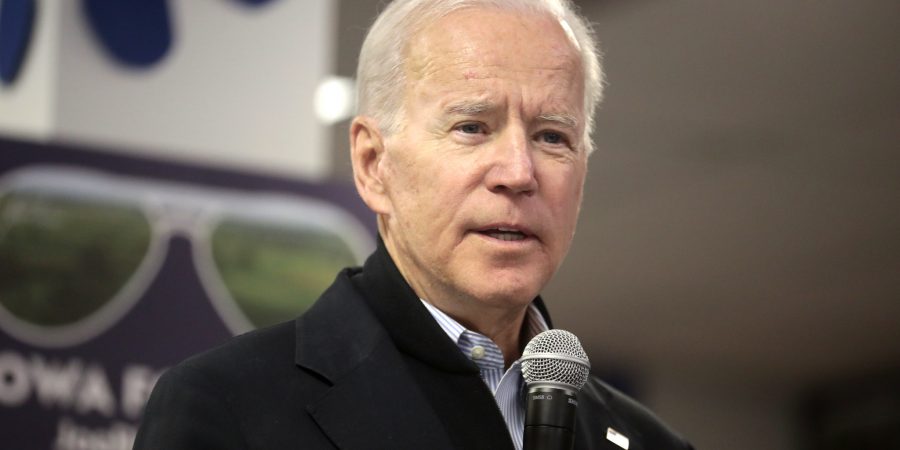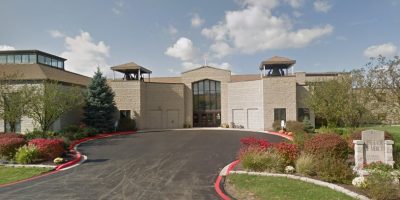Biden “often talks about the comfort and meaning that he’s drawn from faith,” said Buttigieg...
Biden’s bid touts faith, courts even religious conservatives

In fact, Biden’s practice of carrying a rosary that belonged to his late son Beau caught the attention of one of his Democratic presidential rivals when the two were awaiting a debate last year. Standing backstage next to Biden, Pete Buttigieg asked the lifelong Catholic about the prayer beads and fell into a conversation about loss, family and faith.
Biden “often talks about the comfort and meaning that he’s drawn from faith,” said Buttigieg, Biden’s Democratic primary rival-turned-endorser. “That’s something that will resonate with Americans a lot more than usual.”
Democrats are betting on Biden’s evident comfort with faith as a powerful point of contrast in his battle against Trump. The faith-focused work underway within Biden’s campaign suggests that, while he may not significantly undercut the president’s popularity among white evangelicals, he could chip away at Trump’s base by appealing to pockets of conservative faithful.
Biden’s identity as “a very devout Catholic and person of deep faith,” Deputy Political Director John McCarthy said, is “baked into the core messaging and core functions of the campaign.”
Biden launched his White House bid by framing his campaign as a fight for “the soul of the nation,” a subtle invocation of the Catholic beliefs that have guided his life. This year alone, his campaign has released three digital ads focused on faith, including one that credits his religious practices with instilling a “sense of solace.”
It’s a notable contrast with Hillary Clinton, who lost to Trump after a 2016 campaign that largely sidelined her Methodist faith compared to past Democratic candidates such as President Barack Obama.
This year, as Trump promises to be evangelicals’ “champion” on policy, Biden is making a less transactional play for religious support — banking instead on a beliefs-focused brand in hopes that it will be more persuasive than outright agreement on an agenda.
“For faith and values voters,” McCarthy said, Biden’s spiritual authenticity is “the quality they’re looking for.” They might disagree with Biden on a particular issue, he added, but can connect with the former vice president because of a shared worldview.
Whether Biden’s religiosity is enough to counteract potential policy disagreements may depend on the issue in question. The presumptive Democratic nominee’s shift leftward on federal funding for abortions is a potential liability with evangelicals as well as many Catholics, for example: In October, a South Carolina priest reportedly denied Biden Communion because of his stance on the issue.
But Biden has also used moral language and even quoted Pope Francis when discussing other issues that many Catholics support, such as immigration reform, expanding access to health care and taking action on climate change.
“My faith teaches me that we should be a nation that not only accepts the truth of the climate crisis, but leads the world in addressing it,” Biden wrote in a December Religion News Service editorial.
In addition, as the coronavirus pandemic and unrest over racial injustice roil Trump’s presidency this summer, Biden has benefited from an opening to claim the moral high ground. Joshua DuBois, who led religious outreach for former President Barack Obama’s 2008 campaign and first term in office, described Trump’s twin challenges as “the perfect storm” when it comes to projecting leadership to many people of faith.
DuBois argued that the current political climate — combined with the recent Supreme Court rulings on abortion rights and LGBTQ rights that have frustrated many conservatives — has created “a more difficult landscape when it comes to people of faith than the Trump campaign would have liked and expected.”
Biden, DuBois explained, could make “small but meaningful gains” among white evangelicals whose support for Trump has fluctuated by as many as 15 points in recent polls. For example, the president’s Bible photo op in front of St. John’s Episcopal Church in June, which occurred only after hundreds of demonstrators were forcibly cleared from Lafayette Square and a priest expelled from the church, was panned even by prominent evangelical supporters of Trump.
For those believers, DuBois added, Biden could contrast himself as “the type of person who’s going to speak to our better angels.”
Buttigieg, former mayor of South Bend, Indiana, agreed that the presumptive Democratic nominee has a “huge opportunity” to break through with religious voters and lauded Biden for releasing a specific agenda aimed at fellow Catholics.
Biden’s campaign has yet to match the denomination-level outreach that Obama’s 2008 team deployed beyond Catholicism, but insiders say that’s by design. McCarthy, who also spearheaded faith outreach for Clinton, said the campaign looks for ways to bake religious elements into other programs: Biden’s team has already held faith-focused calls with LGBTQ, Asian American, African American, Latino, Jewish and Muslim communities, among other constituencies.
But when it comes to evangelicals, McCarthy said the Biden campaign is targeting outreach to three specific groups that may be more on the fence about Trump: Latino evangelicals, white suburban evangelical women and younger evangelicals, who, surveys have shown, lean less conservative than their older counterparts.
The campaign signaled the seriousness of its play for the evangelical vote on Thursday by announcing the hiring of Josh Dickson to oversee faith engagement. Dickson, a former Republican who declared in 2012, “I’m a Democrat because of my evangelical faith,” previously worked on religious outreach efforts for the Democratic National Committee and Obama’s 2012 reelection campaign.
“Faith-motivated voters — including those traditionally more moderate and conservative — are especially eager to see a president who both shares and leads with the values important to them,” Dickson said in an interview Thursday. “Vice President Biden has stood and fought for these values — loving our neighbor, caring for the poor and vulnerable, fighting against injustice and oppression — his entire career.”
It’s a strategy less concerned about sea change than about marginal gains, designed to siphon away enough votes to splinter the coalition that handed Trump his narrow 2016 victory.
“We are going to go after every vote, but I do not think we will suddenly win the evangelical vote with 80%,” McCarthy said.
Indeed, Biden will face formidable obstacles eroding Trump’s foothold with white evangelicals in particular, 7 in 10 of whom, in a recent survey by the nonpartisan Pew Research Center, approved of how he is handling the presidency.
Meanwhile, the GOP is stepping up its efforts to court evangelicals of color. Thousands of Hispanic faith leaders and congregants have participated in Trump Victory Committee events, with specific programming focused on evangelicals, Republican National Committee spokeswoman Mandi Merritt said.
Tony Perkins, a prominent conservative evangelical Trump backer, said evangelicals backed the GOP overwhelmingly in 2016 not “because they embraced everything about the president. It was because they embraced what he was going to do.”
While many who misunderstand Trump’s appeal to that bloc focus on “personality, not the policy … evangelicals are focusing on the policy,” added Perkins, president of the Family Research Council.
Biden’s team has also worked with African American pastors in multiple states on outreach to Black voters of faith, building on a connection that helped vault him to the nomination. And it has meaningfully expanded faith outreach beyond Christians, hiring a Muslim outreach director in March and a Jewish outreach director this week.
The campaign has already held dozens of faith-focused events — some under the banner of “Believers for Biden” — including calls led by Delaware Democratic Sen. Chris Coons, a Yale Divinity School graduate and Biden confidante.
Describing Biden’s ability to connect with those who share his experience of lost family as a “ministry of presence,” Coons quipped that “the guy does pastoral care better than most of my (divinity) school classmates.”
Dickson insisted Biden’s approach to faith will resonate with a broad swath of religious Americans. “This is the type of leadership that religious Americans — including evangelical Christians, Catholics, mainline Protestants, Mormons and others — are looking for, and we’re making an aggressive effort to show that Vice President Biden’s vision for America reflects their priorities,” he said.
Perhaps the biggest unresolved question is whether Biden will take “a moment,” as former Obama faith adviser Michael Wear put it, to outline “the role that faith, including moderate and conservative people of faith, will have in his administration.”
Obama sought that moment in 2008, meeting privately with evangelical leaders and joining his GOP opponent to speak to megachurch pastor Rick Warren’s congregation. On that stage, he acknowledged “the moral difficulties” of abortion and called for “common ground” on the issue.
Coons said there’s minimal risk to the Democratic hopeful appearing on conservative-leaning Christian Broadcasting Network or another religious forum that might not feel a natural fit. Invoking liberal Sen. Bernie Sanders’ 2015 visit to evangelical Liberty University, Coons said that “you want to connect with everybody if you’re trying to be the president of the United States — not just the president of your base.”
Read more news at XPian News… https://xpian.news



Comments are Closed